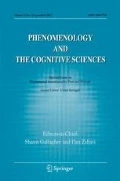Abstract
This paper is an attempt to clarify and assess Dennett’s opinion about the relevance of the phenomenological tradition to contemporary cognitive science, focussing on the very idea of a phenomenological investigation. Dennett can be credited with four major claims on this topic: (1) Two kinds of phenomenological investigations must be carefully distinguished: autophenomenology and heterophenomenology; (2) autophenomenology is wrong, because it fails to overcome what might be called the problem of phenomenological scepticism; (3) the phenomenological tradition mainly derived from Husserl is based on an autophenomenological conception of phenomenology, and, consequently, can be of no help to contemporary cognitive science; (4) however, heterophenomenology is indispensable for obtaining an adequate theory of consciousness. In response to Dennett’s analysis, the paper develops two main counterclaims: (1) Although the traditional conception of phenomenology does indeed fit Dennett’s notion of autophenomenology, his sceptical arguments fail to rule out at least the possibility of a modified version of this traditional conception, such as the one defended in Roy et al. (Naturalizing Phenomenology, 1999); (2) the distinction between autophenomenology and heterophenomenology is at any rate misconceived, because, upon closer analysis, heterophenomenology proves to include the essential characteristics of autophenomenology.
Similar content being viewed by others
Notes
Cf. several of the contributions contained in Petitot et al., (1999).
In a yet unpublished study (cf. Roy, 2001a), I have myself tried to show that the general idea that we cannot capture by linguistic means what is given in consciousness at least does not do justice to the real nature of the operation of description in Husserl.
References
Boring, E. (1953). A history of introspection. Psychological Bulletin, 50, 169–189.
Bozzi, P. (1999). Experimental phenomenology: A historical profile. In L. Albertazzi (Ed.), Shapes of forms. Dordrecht: Kluwer.
Carr, D. (1998). Phenomenology and fiction in Dennett. International Journal of Philosophical Studies, 6, 331–334.
Danziger, K. (1980). The history of introspection reconsidered. Journal of the History of the Behavioral Sciences, 16, 241–262.
Dennett, D. C. (1969). Content and consciousness. New York: Humanities Press.
Dennett, D. (1987a). Quining qualia. In: A. Marcel & E. Bisiach (Eds.), Consciousness in contemporary science (pp. 43–77). Oxford: Oxford University Press.
Dennett, D. (1987b). The intentional stance. Cambridge: MIT Press.
Dennett, D. (1991). Consciousness explained. Boston: Little Brown.
Dennett, D. (2003). Who’s on first? Heterophenomenology explained. Journal of Consciousness Studies, 10, 19–30.
de Sousa, R. (2000). Contre la Phénoménologie: réflexions sur le point de vue de la science cognitive. In R. de Monticelli (Ed.), Phénoménologie et Psychopathologie.
Ericsson, K. A., & Simon, H. (1980). Verbal reports as data. Psychological Review, 87(3), 215–251.
Ericsson, K. A., & Simon, H. (1984). Protocol analysis: Verbal reports as data. Cambridge: MIT Press.
Flanagan, O. J. (1992). Consciousness reconsidered. Cambridge, Massachusetts: MIT Press.
Husserl, E. (1902/2000). Logical Investigations. Amherst, New York: Humanity Books.
Leopold, D. A., & Logothetis, N. K. (1996). Activity changes in early visual cortex reflect monkey's percepts during binocular rivalry. Nature, (379), 549–553.
Misiak, H., & Sexton, V. (1973). Phenomenological, Existential and Humanistic Psychologies: A Historical Survey. New York: Grune & Stratton.
Nisbett, R., & Wilson, T. (1977). Telling more than we can know: verbal reports on mental processes. Psychological Review, 84(3), 231–259.
Petitot, J., Varela, F., et al., Eds. (1999). Naturalizing Phenomenology: Issues in Contemporary Phenomenology and Cognitive Science. Stanford: Stanford University Press.
Roy, J.-M. (2001a). Analyse descriptive et analyse logique (unpublished manuscript).
Roy, J.-M. (2001b). Déficit d’explication et revendication phénoménologique. In B. Pachoud & T. Zalla (Eds.), Intellectica: La conscience.
Roy, J.-M. (2004). Phénoménologie et Cognition. In J. Poust & E. Pacherie (Eds.), La philosophie cognitive. Paris: Editions de la Maison des Sciences de l’Homme.
Roy, J.-M. (2005). Phenomenological claims and the myth of the given. Canadian Journal of Philosophy, Suppl 29, 1–32.
Roy, J.-M. (2006). The naturalist reversal of Husserlian phenomenology. In T. Komendzinski & S. Gallagher (Eds.), Studia z fenomenologii i nauk kognitywnych [Studies in phenomenology and cognitive science]. Wydawnictwo Rafal Marszalek (in press).
Roy, J. M., Petitot, J., Pachoud, B., & Varela, F. J. (1999). Beyond the gap: An introduction to naturalizing phenomenology. In J. Petitot, F. Varela, B. Pachoud, & J. M. Roy (Eds.), Naturalizing phenomenology. Stanford: Stanford University Press.
Smith, E., & Miller, F. (1978). Limits on perception of cognitive processes: A reply to Nisbett and Wilson. Psychological Review, 85, 355–362.
Thompson, D. (2002). Phenomenology and heterophenomenology: Husserl and Dennett on reality and science. In D. Ross, A. Brook, & D. Thompson (Eds.), Dennett’s philosophy: A comprehensive assessment. Cambridge: MIT Press.
Vermersch, P. (1998). “La fin du XIX siècle: intropsection et phénoménologie.” Expliciter (26).
Author information
Authors and Affiliations
Corresponding author
Rights and permissions
About this article
Cite this article
Roy, JM. Heterophenomenology and phenomenological skepticism. Phenom Cogn Sci 6, 1–20 (2007). https://doi.org/10.1007/s11097-006-9030-2
Published:
Issue Date:
DOI: https://doi.org/10.1007/s11097-006-9030-2




